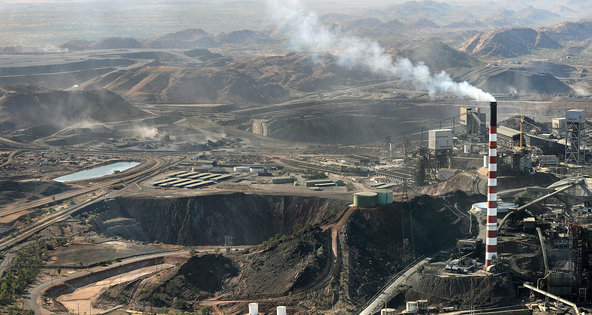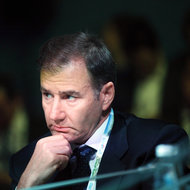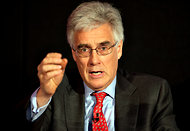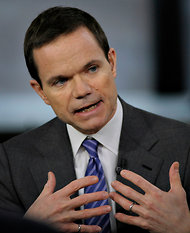 Jack Atley/Bloomberg NewsA copper mine in Mount Isa, Australia, owned by Xstrata.
Jack Atley/Bloomberg NewsA copper mine in Mount Isa, Australia, owned by Xstrata. Simon Dawson/Bloomberg NewsIvan Glasenberg, chief of Glencore International, the largest commodities trading company in the world.
Simon Dawson/Bloomberg NewsIvan Glasenberg, chief of Glencore International, the largest commodities trading company in the world.
A megamerger in the natural resources business is close to falling apart.
On Friday, shareholders in Xstrata, one of the world’s biggest miners of copper and coal, are to vote on an offer from Glencore, which dominates the global trading of such materials. The deal, which values the combined company at $86 billion, would create a commodities behemoth whose activities touch all types of companies that need raw materials to make cornflakes, cars, mobile phones and other goods.
But Qatar Holding, a unit of the Persian Gulf nation’s sovereign wealth fund, is poised to squash the acquisition.
Over the last year, Qatar, an increasingly powerful investor with holdings in large multinational companies, has spent nearly $5 billion amassing a 12 percent share of Xstrata. That stake gives Qatar a big voice in the process, and it plans to vote against the deal.
The deal comes at a pivotal time in the industry. After experiencing strong growth in recent years, commodities prices have sunk over fears that major consumers like China might be pulling back. The weakness has crimped the profits of major players.
The merger of Glencore and Xstrata could have broad ramifications. The combined company would have significant financial heft, potentially setting off another round of consolidation in an industry that needs to wring out cost savings.
The parties are squabbling over price. In February, Glencore, which already owns 34 percent of Xstrata, agreed to exchange 2.8 of its shares for each share of the mining company. But Qatar has been pushing for more, at one point demanding a ratio of 3.25 to 1.
So far, both sides have remained firm in their positions. Last month, Ivan Glasenberg, the chief executive of Glencore, who has developed a reputation as a masterful negotiator, said it was “no big deal” if the merger fell apart. Qatar, meanwhile, is a gas-rich emirate that can hold out for better terms.
Qatar has the support of other Xstrata shareholders. Norges Bank Investment Management, a Norwegian fund, and the investment firm Knight Vinke, have both said they will vote against the deal. Since Glencore must abstain from voting, a group of investors with just 16 percent of Xstrata shares can block the merger.
A solution is possible, but any breakthrough will most likely come at the 11th hour. So far, neither party has budged, according to a banker for Qatar and a banker for Xstrata who spoke on the condition of anonymity.
“This is a game of poker, and the Qataris have called Glencore,” said Andrew Keen, a mining company analyst at HSBC. “What we will find out soon is how much Ivan really thinks Xstrata is worth.”
The deal has been anticipated for years. Glencore has held a large stake in Xstrata since the mining company listed on the London exchange in 2002, and the two companies are deeply intertwined. Mr. Glasenberg sits on Xstrata’s board.
The two companies would complement each other. Glencore oversees a vast trading network that sells billions of dollars’ worth of commodities to manufacturers and governments. It’s a steady business, but the margins are slim. Xstrata owns a mining empire that stretches from Australia to Canada to South Africa. While mining is more profitable than trading, it is also prone to cyclical booms and busts.
So far, Glencore is sticking with its bid. Privately, Mr. Glasenberg has indicated that Glencore could abandon the deal now and pick up Xstrata a year later for less, according to several London bankers and Glencore shareholders who have spoken with the chief executive.
The mining industry’s deteriorating fundamentals bolster Glencore’s stubborn stance. As the price of coal plummeted, net profits for Xstrata dropped by 33 percent in the first half of the year. Since the deal was announced, shares of Xstrata have dropped by 16 percent. Glencore’s stock price has fallen by 10 percent in the same time period.
At current levels, the market values Xstrata at only 2.4 times Glencore’s shares, below the current deal ratio. That means investors don’t expect that the deal will happen — much less that Glencore will sweeten the bid.
But Glencore and Xstrata both have a lot to lose if the deal falls apart.
If Glencore walks away, Mick Davis, the chief executive of Xstrata, could feel pressure from shareholders. Knight Vinke has called for a shake-up of the board in the event the deal fails, pushing to make it “more independent and robust.” Worse, Glencore could turn on Xstrata’s management, joining the calls for changes at the top.
“Xstrata’s problem if it remains a stand-alone company is not about the fundamentals of its mining business but rather about Glencore remaining its biggest shareholder,” said Christopher LaFemina, a mining analyst at Jefferies, the American investment bank.
Glencore faces strategic risk. Without the added balance sheet of Xstrata, Glencore will not have the financial strength to pay for its expansion efforts. As the commodities market weakens and its share price declines, Glencore needs money to increase its trading business, build new mines and oil fields and pursue a new round of deal-making.
“The value of the deal to Glencore is a higher equity valuation and much greater ability to make further acquisitions,” said Mr. LaFemina.
Qatar has opened the door for a potential compromise. A week ago, the sovereign wealth fund said it “will not support the proposed merger terms.” In doing so, Qatar dropped its earlier reference to a specific ratio of 3.25, which analysts say they believe indicates a willingness to negotiate with Glencore.
But with billion of dollars in cash, the sovereign wealth fund can take the long-term view on its investments, rather than wait for the immediate payoff of a deal. Qatar is “very comfortable with the possibility that this merger does indeed fall over,” according to one of the bankers for the emirate who spoke on the condition of anonymity.
Article source: http://dealbook.nytimes.com/2012/09/05/qatar-imperils-big-merger-of-commodity-companies/?partner=rss&emc=rss

